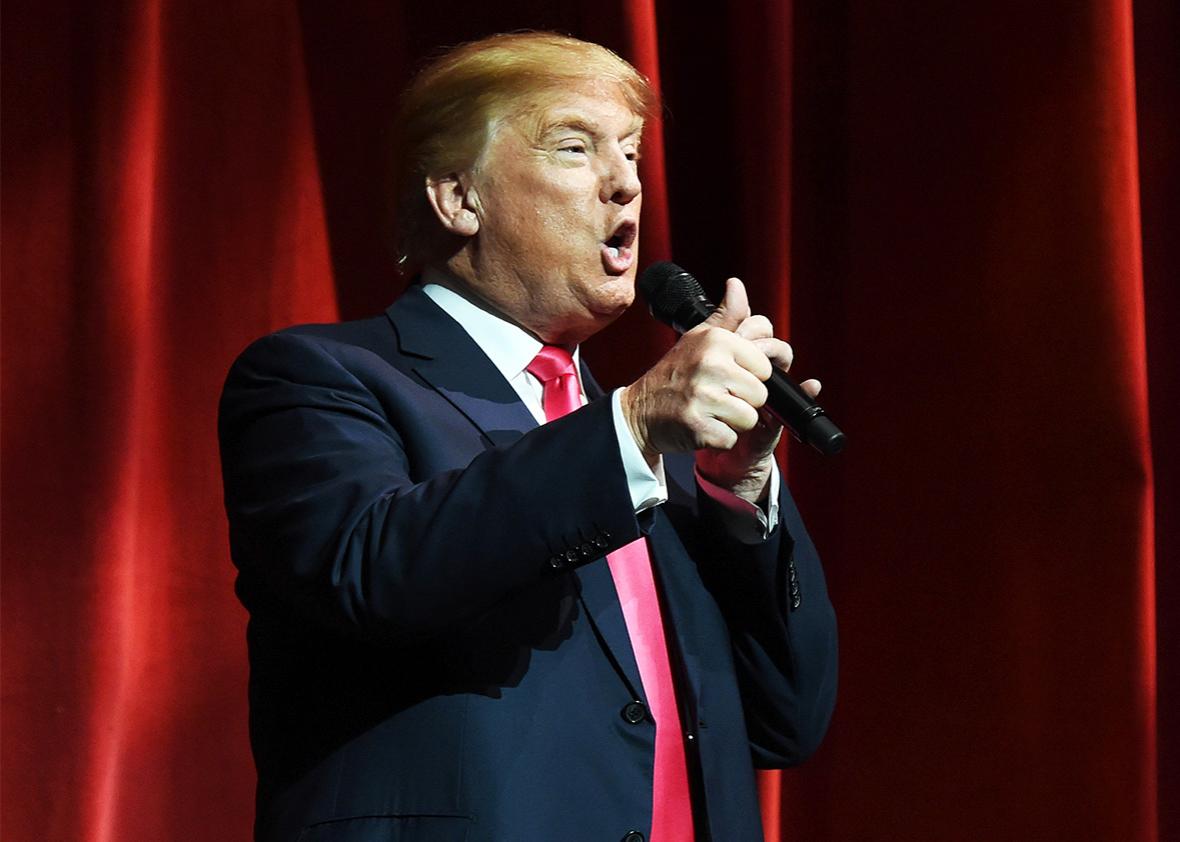Over the past few weeks, conservatives have been weighing what to say and what to do about the seemingly unstoppable rise of Donald Trump. While some have embraced the reality TV star turned GOP candidate, others are mounting a spirited resistance. This week, National Review, the magazine where I proudly hang my hat, published an editorial declaring that Trump did not deserve conservatives’ support. The magazine also put together a symposium in which various conservative luminaries—Erick Erickson, Yuval Levin, John Podhoretz, and many more—made their own arguments against Trump’s candidacy.
The conservative case against Trump is straightforward. His opinions are famously idiosyncratic, and in the space of a few short years, he has gone from backing a single-payer health system to railing against Obamacare. In an earlier political incarnation, he called for a massive wealth tax aimed at millionaires and billionaires. Now, he favors deep cuts in corporate taxes that would greatly enrich millionaires and billionaires. As recently as 2013, Trump embraced the idea of an amnesty for unauthorized immigrants. Today, Trump’s opposition to amnesty is the centerpiece of his presidential campaign. Can conservatives trust this man? Even the most passionate Trump devotees can hardly fault National Review for concluding otherwise.
Nevertheless, Trump’s candidacy does have a unifying theme: nostalgia. In seeking to “Make America Great Again,” he is offering an appeal to the past, when America was a nation of winners. Apart from opposing amnesty for unauthorized immigrants and favoring a reduction of less-skilled immigration, Trump pledges to fight offshoring, to renegotiate or simply tear up various free trade deals, and to bring America’s industrial heartland back to life. As Ben Domenech, publisher of the Federalist, writes in his contribution to National Review’s anti-Trump symposium, the best way to understand Trump is as an aspiring caudillo, who “assures voters that he will use authoritarian power for good.”
As the editors of National Review acknowledge, Trump’s electrifying success is not the product of some mass hypnotic delusion. Rather, it is a direct result of the Republican Party’s failures. “If responsible men irresponsibly ignore an issue as important as immigration,” they write, “it will be taken up by the reckless.” And if conservatives fail to offer an agenda for bettering the lives of American workers, the editors warn, “the legitimate anxieties and discontents of blue-collar voters will be exploited by demagogues.”
If conservatives want to defeat Trump, it’s not good enough to point out his flaws. There also needs to be a candidate who can swoop in and win over the voters who have thus far been swayed by Trump’s message. So, if Trump isn’t conservatives’ best choice, then who is? Are any of his rivals for the GOP nomination up to the task of crafting a working-class agenda and addressing conservative concerns about immigration?
Two candidates, Sens. Ted Cruz and Marco Rubio, have separated themselves from the rest of the field in this regard. Though both Cruz and Rubio have sterling conservative credentials, Cruz has done much to win the support of conservatives for whom ideological orthodoxy is a high priority, while Rubio has sought to appeal to conservatives of a more pragmatic bent.
How are these strategies working out? Consider the travails of Rubio, the GOP candidate who on the surface appears to be Trump’s most formidable rival. Steeped in the rhetoric of movement conservatism from a young age, Rubio is as sunny and forward-looking as Trump is dark and nostalgic. He has championed entrepreneurial capitalism, yet he has also called for modernizing the safety net to ensure that families of modest means are protected from the vicissitudes of a changing economy. Though Rubio is not the only GOP candidate to have addressed the challenges facing working- and middle-class families, he is by far the best at discussing these issues in a compelling, cogent way. Instead of seeing globalization purely as a threat, Rubio welcomes it as an opportunity. To capitalize on this opportunity, he backs a sweeping overhaul of higher education designed to make it easier for workers to upgrade their skills.
None of this has been enough to win over conservative voters. For all Rubio’s virtues, his fumbling attempts to allay conservatives’ fears about his immigration record have badly damaged his prospects. Essentially, Rubio’s willingness to work with Senate Democrats on the Gang of Eight immigration bill has convinced many conservatives that he is either an open-borders ideologue or simply too naïve to be trusted with the presidency. There is still time for Rubio to address these concerns. But time is running short.
Cruz has fared better in recent weeks, and he appears to have a fighting chance of defeating Trump in the Iowa caucus. Having recognized the potency of anti-immigration sentiment among GOP primary voters, he has adopted the most detailed and aggressive strategy for strengthening immigration enforcement and limiting future less-skilled immigration. Yet it’s not clear that Cruz’s hard-edged persona will wear well over time, whether in a general election or in GOP primaries in big, winner-take-all coastal and Midwestern states that may well play the role of kingmaker.
If Rubio needs to seem shrewder and sharper than he has in the past, Cruz needs to seem less nakedly ambitious and more humane. To create the perfect Trump-killer, one would ideally merge the two Cuban American senators into a single Voltron-like Republican presidential candidate, who would combine Cruz’s prosecutorial intensity and hard-line immigration stance with Rubio’s reformist impulses and his optimistic and inclusive tone. Short of such an unholy amalgamation, anti-Trump conservatives are going to have many sleepless nights over the coming weeks.
Read more of Slate’s 2016 election coverage, including:
